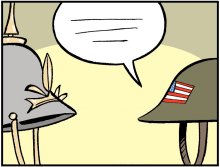 War Propaganda > World War I Post-war propaganda Previous | Next | Index  |
|
In the final months of 1918, as the war drew to a close, the CPI fell under increasing scrutiny from a war-weary American public and from the Republican majority that had gained control of Congress. On November 12, 1918, George Creel halted the domestic activities of the CPI. The activities of the foreign division were ended, amidst great controversy, a few months later. One might assume that the wartime propagandists then put down their pens and paintbrushes and returned to ordinary life. This was not the case. According to Lasswell, many former agents of the CPI stayed in Washington and New York and took advantage of their skill and contacts. Two years later, the Director of the CPI's Foreign Division argued that "the history of propaganda in the war would scarcely be worthy of consideration here, but for one fact - it did not stop with the armistice. No indeed! The methods invented and tried out in the war were too valuable for the uses of governments, factions, and special interests." Sigmund Freud's nephew, Edward Bernays, took the techniques he learned in the CPI directly to Madison Avenue and became an outspoken proponent of propaganda as a tool for democratic government. "It was, of course, the astounding success of propaganda during the war that opened the eyes of the intelligent few in all departments of life to the possibilities of regimenting the public mind," wrote Bernays in his 1928 bombshell Propaganda. "It was only natural, after the war ended, that intelligent persons should ask themselves whether it was not possible to apply a similar technique to the problems of peace." This peacetime application of what was, after all, a tool of war, began to trouble Americans who suspected that they had been misled. In The New Republic, John Dewey questioned the paternalistic assumptions of those who disguised propaganda as news. "There is uneasiness and solicitude about what men hear and learn," wrote Dewey, and the "paternalistic care for the source of men's beliefs, once generated by war, carries over to the troubles of peace." Dewey argued that the manipulation of information was particularly evident in coverage of post-Revolutionary Russia. The Nation agreed in 1919, arguing that "what has happened in regard to Russia is the most striking case in point as showing what may be accomplished by Government propaganda... Bartholomew nights that never take place, together with the wildest rumors of communism in women, and of murder and bloodshed, taken from obscure Scandinavian newspapers, are hastily relayed to the US, while everything favorable to the Soviets, every bit of constructive accomplishment, is suppressed." When one considers the horrible legacy of the war, it is tempting to pin complete responsibility for American involvement on hate-mongering militarists in the CPI. Such retroactive condemnation is no more complex than a wartime slogan. Ultimately, their guilt is less important than the questions their activities raised about the role of propaganda in a democratic society. Democratic theory, as interpreted by Jefferson and Paine, was rooted in the Enlightenment belief that free citizens could form respectable opinions about issues of the day and use these opinions to guide their own destiny. Communication between citizens was assumed to be a necessary element of the democratic process. During the first world war, America's leaders felt that citizens were not making the correct decisions quickly enough, so they flooded the channels of communication with dishonest messages that were designed to stir up emotions and provoke hatred of Germany. The war came to an end, but propaganda did not. For the past seven decades, those who lead our nation, along with those who seek to overthrow it, have mouthed the ideals of Jefferson while behaving like Bernays. Is propaganda compatible with democracy, or does it undermine the population's ability to think critically about world events? What happens when simplistic, emotional appeals are endlessly repeated? During the war, Bourne complained that "simple syllogisms are substituted for analysis, things are known by their labels, [and] our heart's desire dictates what we shall see." Could this description apply equally to a political climate in which slogans like "Three Strikes, You're Out," "Don't Ask, Don't Tell," and "Just Say No" are treated as if they were actual policies for dealing with social needs? What of the propagandist's argument that the complexity of the modern world makes obsolete the Enlightenment faith in popular wisdom? It is impossible for one person to simultaneously be an expert in foreign policy, labor disputes, the environment, the educational system, health care, constitutional law, and scientific regulation. Even the President is forced to rely on the advice of key advisors. Should America follow Bernays' prescription and accept the wisdom of "a leadership democracy administered by the intelligent minority who know how to regiment and guide the masses?" Or is "leadership democracy" simply one stage of our democratic development? Could it someday be replaced by something more far reaching? What contribution will emerging communication technologies make to the dissemination of propaganda? Does the myth of "interactivity" legitimize an unbalanced social relationship, or does it make it possible for the audience to challenge the propagandist? The hosts of radio talk shows claim that theirs is a democratic medium, but callers are screened in advance and filtered through a three-second time delay. Are truly interactive tools on the horizon? The important difference between our "leadership democracy" and a totalitarian state is that we are allowed to raise questions such as these. However, history shows that, in times of political crisis and social dislocation, this freedom is one of the first to disappear. As we approach the end of the twentieth century, finding answers to these questions is more important than ever. |
| Comments to author: [email protected] |